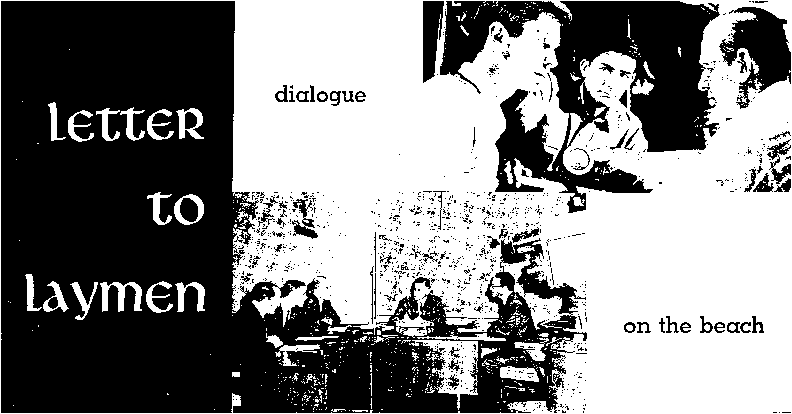
 |
ON A SATURDAY night last month, in a popular time segment usually allotted to westerns, centralTexas televiewers discovered themselves siting in on an Austin Experiment seminardiscussion. This change in television fare represented the first in a series of programs produced by the corporate ministry of the Christian FaithandLife Community under the title, Diologue.
The foremat of the series is geared to the use of current motion pictures, an art form that may be a potential tool of evangelism for the Church somewhat in the same way as the legend, parable, and myth were tools of the ancients in communicating their understanding of life.
The accompanying transcript of the program will indicate the direction of this latest project of the Austin Experiment to discover new ways and means for the Church to speak with increasing relevance in and to the culture of the twentieth century.
The pilot program was produced in cooperation with the representatives of DirectorProducer Stanley Kramer and used his recently released On The Beach as the center of attention.
The Kramer staff in New York provided the Community with a 1 6mm print of the movie from which dramatic segments were included in the TV discussion to heighten interest in the dialogue.
Although such use of an artform to engender significant conversation does not exhaust the meaning of art it has proved invaluable in all of the Community's projects, enabling group after group to experience their own times and lives in greater dimension of depth.
Early in the development of the Laos House programs, great movies such as
Moby Dick, The Shrike, An Inspector Calls, and Heart of the Matter were incorporated into the pedagogical method for the concentrated threeday study periods of laymen and clergymen. The television experiment is the outgrowth of this experie rite.
Although the decision is not yet final, the second Dialogue will probably deal with The Fugitive Kind, produced by Martin Jurow and Richard A. Shepherd. This is the movie version of Tennessee Williams' Orpheus Descending. (See Letter To Laymen, January, 1960, for comments by Bill Cozart on the stage play.)
Whatever comes of the experiment, few movies would have been better for the first attempt than On The Beach.
As Bishop James A. Pike of the Protestant Episcopal Church commented: "It is possible to have a religious film with no religious value and it is also possible to have a motion picture containing no mention of religion that is deeply religious. On The Beach raises the ultimate question of life."
If, as the television discussion assumed, the future is not created out of our hopes and dreams but out of genuine decisions in the present, and if decisions are made through free and open discussion concerning the meaning of human existence, perhaps this method of breaking the riskbarriers to selfdisclosure
will be an effective method of proclaiming the Christian Gospel.
The singular intention and hope of us all is that you will somehow find a way to participate personally in our dialogue and to continue it in the days ahead with the serious minded folk among your own friends.
Gentlemen, to save time, I want to read some informal reminders which may serve as the general ground rules for our discussion:
1nstead of dealing with many issues, we'l1 be really wrestling with only one overal1 question. This I wil1 come to in a moment, but let me remind you that since we intend to talk seriously, the question will necessarily be somewhat personal in nature. We will be approaching this movie as a work of art, as we would any other art form. This means that we will not be raising primarily problems of an abstract, relatively objective nature (as what the message of the film really is). Our concern will be of a far more intimate nature: "What does the film communicate to me?" Not "What does it say, but "What does it say to me." This implies that what Nevil Shute, the author of the novel, intended to say is not our present point. Indeed we'll not be considering the book, at all, but the movie, which is a separate object of art in itself.
Neither will our interest be with what the producer director of the film, Stanley Kramer, meant to convey. We must assume that he like any other artist, said what he intended to say in creating a particular work of art-in this case, a film drama.
Now, before I put the major question, I have a scene that I wish to show the audience which I personally deem the most crucial episode in the whole movie, but I am curious about the scene you might have chosen. If you could pick only one scene which for you draws the whole movie together, which would you suggest?
PIERCE: Well, I know the one that most impressed itself on my consciousness. It was the one
right after the scene we just saw, in which Yeoman
Swaine, whose hometown is San Francisco, slips away from the submarine
to await death which will come from radiation poisoning in three
or four days. I mean that lonely scene in which he goes fishing
in San Francisco bay, and there he is fishing, all alone. This
for me portrays the total, resigned loneliness of the whole movie.
MATHEWS: (Narrating over film clip from the movie.) Ladies and gentlemen, you are watching the United States atomic submarine "Sawfish 623" as it passes through the Golden Gate in Stanley Kramer's film drama, "On the Beach," created out of the now famous novel by Nevil Shute. In a moment, you will look through its periscope at the sobering sight of a ghost city. That ghost city is San Francisco, U.S.A.
This movie is a film about nothing less than the end of the world, a literal Armageddon. The time is January, 1964. World War III is past. It was a nuclear war, actual causes unknown. Everything happened too fast, perhaps it was all a mistake. a fluke. But it s over now, and the entire population of the northern hemisphere is wiped out. The radioactive fallout is slowly but relentlessly moving southward on the currents of the wind where the remnants of the race await death. Six months maybe less, and the human race is extinct.
These last days of history are waited out by the Australians plus this crew aboard the American submarine. They are investigating the last vestige of hope for continued life on earth by their undersea voyage to North America. As you are seeing, the report is negative.
It's the waiting, the hopeless waiting that makes the drama. Or rather it's the life responses forged by the five principal characters to the waiting for the slow, inevitable doom of nuclear fallout. Frightening? Maybe. But I am inclined to say that here is a drama of possibility; a picture of life, if you please.
(As each crew member looks through the periscope:) How do you live
when life meets you as the destroyer of everything you've ever loved? How do you live when life comes to you in the form of slow, inevitable death . . . the future utterly cut off . . . just waiting for nothing? How do you live when life confronts you with the. final extinction of the whole human race? How do you live when life faces you with the senseless irrationality of history, itself? How do you live when life involves you arbitrarily in tragedies over which you have no control?
MATHEWS: Good evening. My name is Joseph Mathews and I have a growing concern about the vanishing activity of serious conversation in our culture. I am convinced that the neglect among us of continued honest and open talk about the significant issues of life is having tragic consequences for our individual and collective destinies; and that all of us who are so concerned must strive to create opportunities, large and small, to do something about it.
Not long ago I saw "On The Beach." I was impressed to the point of urgency. So much so, that simply in the interest of promoting serious conversation, I have invited some friends of mine, who also saw the movie, to join me in an informal seminar discussion of this play.
 |
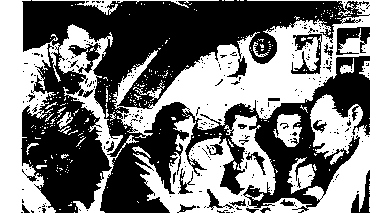 |
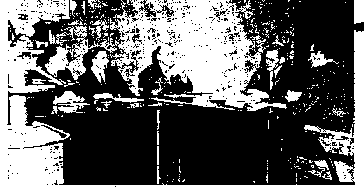 |
BROCKVVAY: The scene that struck me was one of a terrifying automobile race, in which cars
were running off embankments in flames, going up in smoke after crashes. The important thing in it for me was that the atomic scientist who entered the race finally went off and left all the other cars in their destruction, and was left . . .
BRYANT: I'm not sure how you would relate this scene to the whole theme of the movie.
BROCKV`AY: Well here was a man who had entered into a race knowing full well that he might
be killed, in fact I suspect he even intended to die in the race. Instead, he won. He lived. He was still left with the same question as everybody else in the movie, how is he going to live with the life that has been given him in the face of his death.
SLICKER: The next scene is the one that got hold of me. And that's where Dwight, the submarine
commander. when he got the chance to do the one thing he had always wanted to do, and this was to go to some secluded spot trout fishing, to spend just a few days in quiet before the impending doom came upon him . . . When he got there, he found the stream banks lined with lovers, crowded by wild drinking parties, and trout fishers all up and down the stream. and scouts hiking through it. He found the whole world was seeking diversion just as he was.
MATHEWS: I wonder if maybe under similar circumstances I might myself be seeking some
kind of distraction, but anyway this isn't the scene . . .
BRYANT: I'm not sure that I know the scene you are thinking of, but the one I would choose
would be the cocktail party which was shown near the beginning of the movie.
MATHEWS: What about the cocktail party?
BRYANT: As I remember it, there was a discussion going on at the party about who was
MATHEWS: Well, obviously that's my scene. Let's look at it.
SLICKER: I must say that after seeing that scene again, it does get hold of me more than the fishing scene.
MATHEWS: Every time I see it, I have a deeper appreciation for Mary's feelings. But let's turn
to the whole film once more. How did it impress you? Not what did it say, but how were you addressed by On The Beach? Perhaps this will help: What mood did it leave with you after you saw it?
SLICKER: When I came out of the movie, I had the feeling of suffocation. Of being boxed in. Trapped.
BROCKWAY: I did too.
SLTCKER: Here were these people who on]y had five months to live.
Doom was approaching all of them. They couldn't go to another continent, they couldn't blow the winds back. They couldn't have another operation or take another shot of medicine to cure this; they were boxed in like a rat in a trap.
PIERCE: What do you mean that you felt trapped, though?
SLICKER: I'm not quite sure, but maybe it's the sudden realization that what's going on in this
world includes pressure that I can't avoid in life; that my world, in a way is a trap, I can't escape it.
BROCKWAY: But what does it mean to be trapped like that?
responsible for this whole atomic war and this cloud of death. And then someone remarked in the midst of the conversation, that it doesn't really matter who is responsible, that the radiation is going up steadily in the very room where they are partying. And this causes Mary Holmes, the hostess, to break up. She rushes in and cries out, "There must be some hope, there's got to be hope."
SLICKEH: Well, you're forced to make a decision about how you're going to live. How to live in this kind of a world. Whether you are going
to escape in illusionary hope or beat your brains out against the wall or the trap, or decide to dive in the midst of this trapped life.
BRYANT: I came out of the theatre with a sense of lostness. In trying to
understand this, I guess I realize that we are living in our dreams of the future all the time: that our values, even our moral systems, do not control what's going to happen. A mother is always making her decisions relative to the future of her children, students relative to their jobs and their marriage and what's going to be. And when everything is compressed down into a few brief months or a few moments, a question mark comes over everything in life. All our values . . .
PIERCE: Yes, I wonder if everybody's value system in the movie was
destroyed. as you put it. I think that the picture put this problem, as
you describe it, right in the laps of every character in the movie, and
everyone in the theatre.
BRYANT: This is what came back to me. The people in the movie are
forced to say. "Why am I going to do this, why am I going to do that." All the rules, patterns, and standards that we ordinarily use seemed inadequate. There was a sense of freedom when the future wasn't there, but then there was a great uncertainty about what to do with this free- dom when I don't have the old hopes and dreams and plans that I can structure a life around. This was the feeling that poured out upon me as I stepped into the street.
PIERCE: Yes, when I came out of the movie, I don't know exactly how to describe it. ..
MATHEWS: Wait a minute, Mr. Pierce, I want to ask a question here. What did the people in the movie do under these circumstances?
BRYANT: Well, some of them tried not to face up to the fact that the future was gone, they kept on "building their life" making their plans and their dreams: and, yet all the time, in the back of their minds. there was emptiness, this hollowness, this frustration, this sense of hostility because of what had happened.
MATHEWS: I see Excuse me, Mr. Pierce.
PIERCE: That's quite all right. I was just going to say that I felt
something very similar, only I would describe it as a sense of embarrassment, a feeling of having done something foolish. and I guess the word that would best describe it would be embarrassment.
BROCKWAY: About what in particular?
PIERCE: I'm not sure exactly, it's the feeling of having done something that didn't need to he done, the consequences of it are pouring in upon me and there's no way to erase those consequences. In this case the whole world has done something ridiculous: all mankind, and I, as a member of the human race, had done something foolish and that left me with a feeling of guilt, of cold, passive nausea, guilt . . .
BROCK\VAY: In other words, you felt responsible for this atomic war.
SLICKER: Did you sense that the characters in the movie felt this guilt?
PIERCE: Oh, yes. From the way that they tried to get away from it.
I agree `with Bob it was a matter with each character of either giving
yourself a snow job about life or letting life hit you with its reality just
as it comes.
MATHEWS: As a matter of fact, I think that all of you have made in
one way or another, something similar to this last point. That the movie boils down to the people being pressed to make a decision as to whether they really going to live in this world as it has given to them, or whether they were going to find some illusion to live in.
SLICKER: Either live with your eyes open, or bury your head in the sand. BRYANT: I saw it rather like somebody who wakes up in the morning
and lifts the shade and sees a world outside that he wished wasn't there, so he pulls the shade back down and goes to bed and dreams some other world is going to come up while he's asleep.
MATHE\VS: If this is the way you are going to put the problem, I want to hear you deal concretely with some of the characters in the light of it.
SLICKER: I've got one Mary, the wife of the Australian naval officer.
We saw her in the cocktail party scene. In hysteria she cried, "There is hope, there has to be hope, there is always hope, you can't go on like this." And throughout the movie she kept refusing to believe that the doom was coming. She grabbed every piece of gossip that said there might be hope. She never wanted to talk about what vas going on, she wanted to hold on to the past. Indeed, in her illusion, she became a little child again and wanted to go home to her mother.
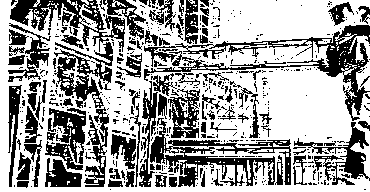 |
BRYANT: She was a person who had structured her whole life around
the way her baby was going to grow up and the way she and her husband were going to fulfil1 their lives. When something comes to say No to this, ,nel1, she was not going to take the No, she vas going to keep looking for some possibility that what she had dreamed and planned for her child and for herself would work out. No matter how clear it became that this wasn't the way it is. She kept fighting against reality, rebelliously striking back at anybody who would try to threaten what she had anticipated.
MATHE\VS: But do you think that, at the end of the movie, where she
was resigned to having to take the pil1 to kill herself to avoid the agony of death by radiation, that she came to terms with her situation.
SLICKER: No, I don't think so, because her husband had to tranquilize her by going back and talking about the past and the nice moments of their courtship.
BRYANT: Well, even in this sense, Joe, you are saying that she is looking upon this adventure of death with her husband as a sort of romantic experience.
PIERCE: It's illusion either say, isn't it? What you're saying is that she chooses to go into a psychotic illusion.
BROCKWAY: Well, it's interesting to me that this illusion business
comes out in Dwight just as much as it does in Mary, For Dwight was escaping from the present into his illusion of the future, just as Mary was escaping the present into some illusion of the past. But Dwight didn't realize this until that scene in a railway station in which he acknowledged that he was unable to cope with the absolute destruction of his carefully worked out plans for himself and his family. Although he knew that everybody in America dead, he just couldn't acknowledge that his wife and children were really gone.
PIERCE: Yes, but we know, Allan, do we not, that it is because of his
Navy training. As a naval officer he always had to train himself to think
of himself as dying, but he had to go on thinking that his family would
live.
BROCKN\7AY: But that s just as much an illusion.
BRYANT: One thing you can say about Dwight is that when he got back
from the submarine trip to San Francisco, the illusion is gone, and he goes ahead and relates himself to life without holding on to the memory of his wife and children.
MATHEWS: You're saying that at least one character came to terms with what was going on and decided to live his life as it Has given to him.
SLICKER: And it only happened when the bubble of his illusion burst.
BROCKWAY: Where was this?
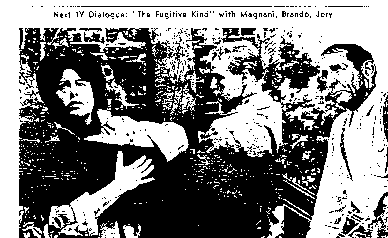 |
SLICKER: What Bob was pointing to. When he went to the ghost city of San Francisco and this stark, naked reality, hit him in the face.
BRYANT: But Joe, what did he do about the fact that he still was a naval officer? He never got rid of this image of himself.
SLICKER: Well, I'd like to disagree. Just because he had a choice to be
a naval officer or be something else, are we to say that he should take some other alternative?
MATHEWS: But there's still even a more complex character perhaps, and that's Moira, and I'm wondering why she hasn't been mentioned already
BRYANT: Well, the scene where Moira's character seems to come through}
is the one where she is with the scientist when he is working on hi. racing car just before the race. She is a person who has lived very carefree towards life, lots of parties, lots of romances, and now in the face of the emptiness of life, the uncommitted aspect of her life, she has nothing to hold on to. So she begins by trying to find some meaning and fulfillment in relationship to Dwight. In this scene I'm talking about where Dwight has told her earlier that he can't give up the memory of his wife, she comes back to the scientist, an old lover. She's aware then of who she really is. She is aware of death, but she has a little time to live, and is trying to reach out towards anyone and to grab hold of anything that will give her life significance.
MATHEWS: Then are you saying, that in the life of this character there as a decisive, dramatic turning point?
SLICKER: Yes, there was. She saw that she was uninvolved with life and that all of her attempts of escape were impossible. Then, for the first time, she had new possibilities. I think this is dramatically shown in the last scene where she and Dwight are separating. She said, "Well the time has come to say goodbye, and this has been life."
PIERCE: What does that mean, Slick, "This has been life?"
SLICKER: Well, it meant that in view of the doom upon them, they
could not be married, they could not have children, but they lived the life that was given to them
MATHEWS: I'm afraid I'm going to have to cut this off, for I want to
show another dramatic sequence to the audience. This one, you have already mentioned. It's of Dwight and Moira at the railroad station when he tells of the collapse of his plans for the future.
MATHEWS: It has been helpful for me to relive this motion picture
through our conversation. It has enabled me to experience my experience in a new dimension, if you know what I mean. But we are not quite finished. If good art deals with the interior being of man, and I believe this is the case; and if this movie is good art, and I feel that it is: there perhaps each of us ought to try to sum up, by way of a conclusion how we personally feel that it addresses the human situation in general.
BROCKWAY: This movie says to me that existence is always uncertain
and finally incomprehensible, and that I must decide to exist either in awareness of this reality or in an illusion.
BRYANT: The death at the end of this movie made me realize that I
was alive. And I sense this both as a gift and as a condemnation, for to live means to be responsible, to take the burden of my own freedom upon me before all the open possibilities. And it means to face this world just as it is without any false dreams or hopes.
PIERCE: What the movie leaves me with is the arbitrariness of history the arbitrariness of life, of al1 our lives, without any justification.
SLICKER: This movie forces our freedom upon us to accept and to creatively enter into whatever is going on in this world even if it's our guilt and doom, without any absolute standards to pin our hopes on, but daring to decide what we will do and taking full responsibility for our actions.
MATHEWS: What you have just said brings to my mind the l9th century philosopher who suggested that when any man stands at the raw edge of life he has but two possible contexts in which to live and decide: that of affirming what is given or that of negating what is given Just at this point, there the characters in this movie stood, it seems to me that there is but one relevant word for man: That he is received ir this world, that history is significant-even the end of history, and that man can therefore dare to live and dare to make his decisions to our very end. For death awaits us all.
Finally, On The
Beach has impressed upon
me afresh that the future is not made out of our hopes and dreams,
but that our actual tomorrow are forged out of the concrete decisions
we make today. And, lest we forget, authentic, free, intelligent
decisions arise out of open, honest serious dialogue with
others. Good night, and thank you.